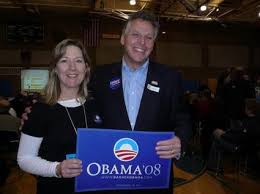 Tim Craig has left the Washington Post's Virginia beat to cover DC city hall, but I guess he's still doing some Virginia political analysis. This morning, Craig writes about how Terry McAuliffe's campaign "bears a surprising likeness to the strategies Obama used so effectively in 2008."
Tim Craig has left the Washington Post's Virginia beat to cover DC city hall, but I guess he's still doing some Virginia political analysis. This morning, Craig writes about how Terry McAuliffe's campaign "bears a surprising likeness to the strategies Obama used so effectively in 2008."Terry McAuliffe was stung when Hillary Rodham Clinton's presidential campaign, which he oversaw, fell to Barack Obama last year. But over the course of the campaign, it appears he took careful notes.In addition, Craig points out, McAuliffe is utilizing text messaging and a logo with sun imagery, is staying "relentlessly positive" and not attacking other Democrats, is running as a Richmond outsider, is pledging not to take money from companies that received federal bailout money, is organizing a huge field operation, etc.
Now, as McAuliffe finds himself in a hard-fought race for governor of Virginia, he is employing many of the same tactics his opponent used successfully just a year earlier. He is reaching out to new voters, exploiting new technology and casting himself as a fresh-faced outsider. He is not taking any region for granted, is targeting African Americans and is swarming communities with paid organizers...
In his matchup against Brian Moran and Sen. R. Creigh Deeds for the Democratic nomination, McAuliffe is even replicating Obama's use of a one-word campaign theme. For Obama, it was "change." McAuliffe's mantra is "jobs," a word he says over and over.
To some degree, what McAuliffe is doing is what any modern campaign does: adopting and expanding on the latest innovations.
Meanwhile, if Terry McAuliffe is attempting to run Barack Obama's campaign, what about Brian Moran and Creigh Deeds? With regard to the latter, I'd say that Deeds is trying to be John Edwards in terms of populist messaging, such as his criticism of "entrenched political and moneyed interests" (Aznew's words) and his emphasis on working people. Deeds' campaign also is similar to Edwards in that it is operating on a shoestring budget compared to his two rivals. Finally, just like Edwards, Deeds is the "rural" and "southern" candidate (Edwards from North Carolina, Deeds from Bath County) who is trying to win support in urban and suburban areas against two candidates from the same region (Obama and Clinton from the north - Illinois and New York; McAuliffe and Moran from Northern Virginia, New York and Massachusetts).
Meanwhile, Brian Moran's campaign appears to be a hybrid, at once trying to position its candidate to the left of the other major candidates (like John Edwards) while simultaneously trying to run as the "it's his turn, he earned it" guy. Just as Hillary Clinton's messaging changed with the rise of Barack Obama, Moran's messaging has shifted significantly since early in the campaign when it was just a two-way race with Creigh Deeds. Back then, Moran clearly was running as the confident, almost cocky candidate who could raise the most money and collect the most top-down endorsements. With Terry McAuliffe's entry into the race, the tone and content of Moran's campaign changed, just as Clinton's campaign changed (more populist and aggressive, among other things) as it realized that Obama posed a real threat. One difference between the Moran campaign and the Clinton campaign is that Moran has significantly more netroots support than Clinton did, although some of that - particularly in the national blogosphere - appears to be motivated more by anti-McAuliffe sentiment than by any particular passion for Brian Moran or concern about Virginia. Finally, the Moran campaign is stocked with Clinton supporters and high-priced campaign staffers and consultants like Lionell Spruill, Mame Reiley, Jerome Armstrong, and Jean Jensen. As I recall, the Clinton campaign raised a lot of money but also spent a lot on its panoply of high-priced campaign staffers and consultants. Sound familiar?

